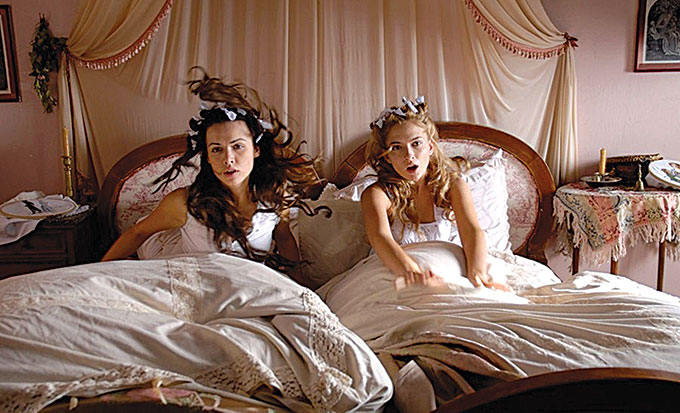Kino Polski
by M. Faust & George Sax

Polish Film Showcase at Canisius College
A selection of the best of recent Polish cinema will be presented next weekend at the annual Polish Film Showcase, sponsored by the permanent chair of Polish culture at Canisius College.
Although the series doesn’t officially begin until next Thursday, you can get a head start on Monday evening (November 7, 7pm, free admission), with Irena Sendler: In the Name of Their Mothers. The documentary tells the story of Catholic women in the Warsaw ghetto who, in 1939, organized efforts to protect Jewish orphans and when possible smuggle them to safety. The story is told by Irena Sendler, who was 29 when she organized her friends to save more than 2,500 children: She was nearly 100 when director Mary Skinner (who will be present for the screening) interviewed her for this film. This preview is free and open to the public.
Sendler’s story is bookended by the closing film, Joanna (Sunday, November 13, 4pm), veteran filmmaker Feliks Falk’s deeply moving story of a woman’s sacrifice to save a Jewish child. Joanna (played by Urszula Grabowska, named best actress for her performance at the Polish Film Awards and the Moscow International Film Festival) is a waitress at a Warsaw café when she finds a young girl, hiding after a raid in which her mother was taken away. She doesn’t think twice about protecting a child in need, but it’s a choice for which she pays dearly, given that she doesn’t have the network of other women forged by Irena Sendler. Beautifully filmed in muted tones, it is a heartrending film that you won’t soon forget. Feliks Falk will be present for the screening.
A more lighthearted presentation is the classic comedy Sluby Panienskie (War of Love, also known as Maiden Vows, Friday, November 11, 7pm), adapted from an 1833 play that is still regularly produced on the Polish stage. Like one of Shakespeare’s comedies, the plot involves several pairs of young couples who find subterfuge necessary to smooth the path of true love. The play was written by Aleksander Fredro, whose Zemsta was filmed in 2002 with Roman Polanski in a leading role (you may have seen it when it played at Hallwalls). Writer-director Filip Bajon gives it a handsome widescreen production with the country settings marked by some oddly anachronistic touches (or were cel phones and Prozac common in Poland 175 years ago?)
Poles know “Black Thursday” as the date in December 1970 when, after large hikes in food prices led to anti-government rallies, 45 protesters were shot and killed in the port city of Gdansk. Another 1,600 were wounded, and more than 3,000 were detained and interrogated by the military police. Czarny Czwartek (Black Thursday, Saturday, November 12, 7pm) dissects the events leading up to that day, the beginning of a consciousness that led a decade later to the Solidarity movement. The film largely takes place through the experiences of Bruno Drywa (Michal Kowalski), a shipyard worker with no interest in the protests who becomes caught up in them anyway as he tries to get to his job.
Marian Kolodziej was one of the first prisoners to arrive at Auschwitz. He survived but never spoke of his experience for 50 years. After a stroke in 1993, he began rehabilitation by doing pen and ink drawings depicting his experiences in the concentration camp. In the short feature “Labirynt” (“Labyrinth,” Sunday, November 13, 3pm), he guides the viewer through his drawings and art installations, which express memories for which words are inadequate. The film will be introduced by its producer, Rev. Ron Schmidt, S. J.
Polish Film Showcase
All films will be shown at the Montante Cultural Center, 2001 Main Street at Eastwood. Admission is $5 except as noted. Free parking is available across Main Street from Montante in Lyons Hall lots #1, #2, and #4.
> by M. Faust
•
The Winner

Wieslaw Saniewski’s The Winner (Thursday, November 10, 7pm) offers a rather cynical view of international classical music piano competitions, and this attitude is pivotal in moving the film’s narrative forward. As it begins, Oliver Linovsky (Pavel Szajda), a young, widely acclaimed pianist, has just lost a Chopin contest in Poland, as well as his wife, and, it appears, his will to perform. He walks off the stage of a concert hall in Wroclaw, without playing a chord, and immediately becomes a notorious pariah in the music world. He’s also marooned in this city without access to cash or credit to pay for his fare home to the States or continue his stay in his hotel. He’s rescued from this plight by Frank (Janusz Gajos), a much older former math teach who once lived in Chicago.
The Winner’s plot turns and its general air of indifference to plausibility calls into question the seriousness of its disapproval of piano competitions, and the pressurized existences of performing artists. As it transpires, Oliver’s loss at the contest was undeserved, but by the time the movie gets to that, Saniewski has focused on the odd-fellow buddy story of the two men, one in which they will save each other’s lives, at least figuratively. The classical music milieu is really in there to serve a theme of personal freedom and individual integrity, which The Winner pursues with a series of sentimental coincidences and contrivances. Here and there, it works itself up to a mildly affecting level, but it never becomes very convincing or dramatically involving.
> by George Sax
blog comments powered by Disqus
|
Issue Navigation> Issue Index > v10n44 (week of Thursday, November 3) > Kino Polski This Week's Issue • Artvoice Daily • Artvoice TV • Events Calendar • Classifieds |









 Current Issue
Current Issue